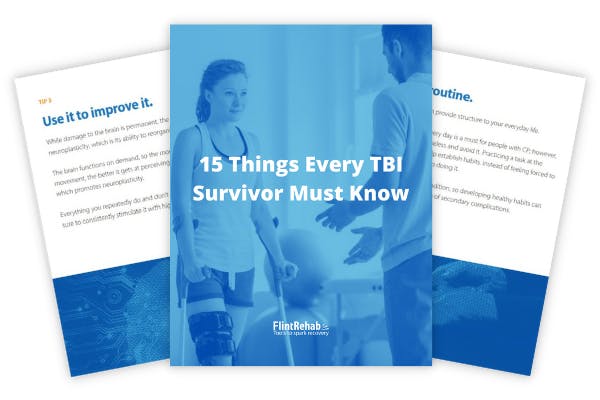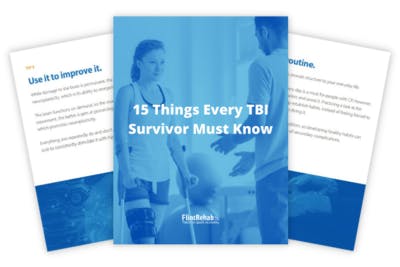No products in the cart.
No products in the cart.
No products in the cart.
No products in the cart.
Home » Neurological Recovery Blog » Traumatic Brain Injury » Understanding Dysphagia After Head Injury: Why It Happens & How to Recover
Last updated on December 17, 2020

Dysphagia is a common physical effect of brain injury that makes it difficult for patients to swallow on their own. It often affects people in early stages of severe brain injury recovery.
To help you manage dysphagia after TBI, this post will discuss the causes and treatment methods.
It’s important to work with a qualified speech therapist to diagnose and treat dysphagia after brain injury. To provide an idea of how your speech therapist may treat dysphagia, this post will also share some exercises that help improve your swallowing skills.
Use the links below to jump straight to any section:

Before we can discuss treatment for dysphagia after a head injury, we will explain how swallowing works. Although swallowing may look like a simple action, it actually involves 26 different muscles in the mouth, neck, and throat.
All 26 muscles must coordinate with each other to get food and liquid from your mouth down to your stomach. To accomplish this, your brain sends signals to each muscle, telling them precisely what to do and when to do it.
The swallowing process consists of four stages:
Depending on where the brain damage occurred, you may have problems with any one or more of these stages.
For example, your brain may no longer signal your mouth to produce saliva, which will make food stick in your mouth and throat. Or your brain injury could weaken your tongue and lip muscles, which will not only make swallowing impossible but also cause slurred speech.
This is an example of how every brain injury is different, and therefore symptoms manifest differently in every patient.

Many people with dysphagia do not realize that they have problems swallowing. This can lead to serious health hazards. The following are a few signs that your loved one might have dysphagia after their head injury:
Severe dysphagia can lead to aspiration. Aspiration is usually accompanied by fits of coughing and wheezing, as the body tries to force the foreign objects out of the lungs. If the person can cough hard enough, they may be able to clear out their lungs before pneumonia develops.
However, often severe head injury patients do not have this cough reflex. As a result, they may aspirate food and water without even feeling it. Doctors call this phenomenon silent aspiration, and it can be extremely dangerous.
Since silent aspiration may cause serious cases of pneumonia, caregivers should familiarize themselves with the symptoms of dysphagia and take steps to prevent choking.
There are also several swallowing tests that doctors use to confirm a diagnosis of dysphagia. These include:
Once your doctor makes a diagnosis, you can move forward with treatment.

There are several effective ways to treat dysphagia after a head injury.
The most severe dysphagia patients may require the use of a feeding tube that delivers food directly to the stomach to prevent choking and malnourishment.
Normally, severe TBI patients that require a feeding tube can receive ongoing care at a skilled nursing facility.
If you don’t require a feeding tube, then your speech therapist may teach you compensation techniques to eat safely along with exercises to improve your swallowing skills.
Exercises are important for recovering from dysphagia after a brain injury because it helps stimulate the brain and activate neuroplasticity. Consistent, regular exercise helps improve your swallowing skills — the same way that consistently practicing anything improves a skill.
The brain responds to repetitive practice. Next, we’ll discuss a variety of therapeutic exercises that your speech therapist may recommend for dysphagia recovery.
Your Speech-Language Pathologist is the best person to ask for recommended exercises. They understand how to choose the most effective exercises for your ability level.
Below, you will find some common swallowing exercises that may help with dysphagia. Please consult with a speech therapist before you begin exercising.
This exercise strengthens your cheeks and tongue, which may improve swallowing skills.
You can also try holding your breath as you swallow. This uses more muscles, which may improve the strength in your throat and tongue.
If you do these activities frequently, you may rewire your brain to recover muscle strength and coordination in your mouth.

During TBI recovery, your speech therapist may recommend compensation techniques to eat and drink safely.
Your speech therapist may also create a personalized diet that fits your needs, and some foods they might suggest include:
In addition, avoid crunchy or sticky foods such as nuts and crackers until your speech therapist approves.
For most brain injury patients, dysphagia may improve after several months of rehabilitation.
There are several signs that doctors look for that may indicate that swallowing will return soon, including:
If these signs are not present, the person may still overcome their dysphagia, but it will take more time and effort.
Swallowing is a complex process that involves multiple areas of the brain and over two dozen muscles. Damage to any of these can lead to dysphagia.
Since dysphagia is so dangerous, it’s crucial to find a speech therapist who will teach you exercises that improve your swallowing skills.
As you practice those swallowing exercises, your brain relearns how to control your mouth muscles again, and your dysphagia may improve.

If you like our content, you’ll love our ebook and newsletters! Get instant access to our TBI recovery tips ebook with 20 pages of helpful advice by signing up below.
You’ll also receive our emails that share survivor stories and more useful TBI recovery tips, which you can opt out of at any time. (We know you’ll love them, too.)
We will never sell your email address, and we never spam. That we promise.


Time with a speech therapist is extremely valuable during recovery, especially if you struggle with communication, critical thinking, or memory after brain injury. Insurance typically covers speech therapy for a fixed amount of time. But once it’s over, recovery is in your hands.
That’s why a team of neuroscientists and clinicians from Boston University created the CT Speech & Cognitive Therapy app. Designed for those recovering from stroke, TBI, or living with neurological conditions, the app contains over 100,000 cognitive exercises that are all available right from your phone or tablet. That’s like having a speech therapist by your side whenever you want!
This app is the perfect fit if you want to improve your speaking, memory, or general mental sharpness. And, it’s affordable at just $29.99/month!
“For the past 6 months, my son has used the app about three times a week. The app is like a virtual therapist, it’s very easy to use, and it gives him immediate feedback.
He now understands things faster, can make decisions with less hesitation, has improved recognition of words, and his confidence is higher. I also find it easy to get in touch with customer service; they pleasantly help out. The whole experience has been great.”
— Miriam
With the CT App, you can get the guidance you need right from your phone or tablet. You can use it on your own or in between sessions with your speech therapist.
Whether you struggle with aphasia, memory loss, or critical thinking, the CT Speech & Cognitive Therapy App can help.
“The CT app has helped me gather my confidence by building on and reinforcing old forgotten skills. It helps to see my percentages increase, and work harder when they decrease. It’s very self-motivating.” -Kathryn
We are confident that this app will help improve your speech and cognitive function after brain injury. Like our recovery tools, the CT App is also covered by our 30-day money-back guarantee.

Do you know these 15 TBI recovery tips?
Get a free copy of our ebook 15 Things Every TBI Survivor Must Know. Click here to get instant access.
Grab a free rehab exercise ebook!
Sign up to receive a free PDF ebook with recovery exercises for stroke, traumatic brain injury, or spinal cord injury below: